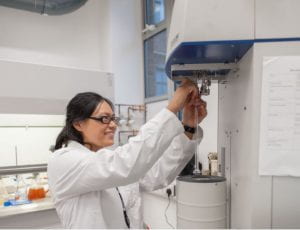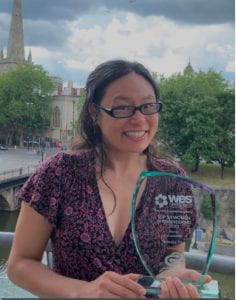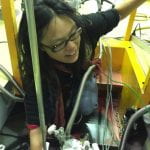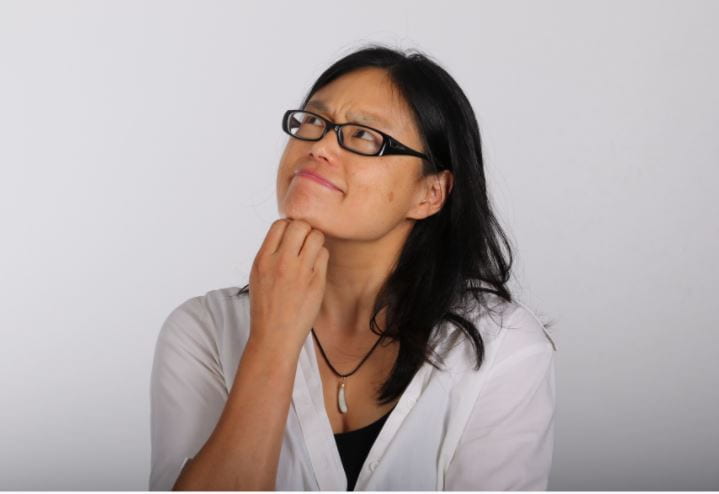Promotions and Progression: Valeska Ting
“Don’t be afraid to move out of your comfort zone or to put yourself out there.”
Professor Valeska Ting is the new Faculty Research Director for Engineering, and a Professor of Smart Nanomaterials within Mechanical Engineering. She holds a prestigious EPSRC Research Fellowship in Energy Materials and until recently, was the School Research Director for CAME (the School of Civil, Mechanical and Aerospace Engineering). She tells us about how she got here and why it’s so important to seek support (and a second opinion!) when considering your career options – particularly when it comes to promotion.
Tell us about you – where are you from, who you are outside of work?
I was born and grew up in New Zealand. My parents were immigrants and they were always adamant that me and my sister should go to university, and so they worked hard to make sure that we had a good education.
My dad didn’t have any sons, so he told me and my big sister that one of us needed to get a doctorate, so that we would have the title Dr Ting, and keep the family name! I think the best thing about getting the PhD and later becoming a professor was getting to tell my dad and to see how proud he was.
Tell us how you got here – what did you do to get here, what decisions did you make, what motivated you?
I did my 1st degree in material science in New Zealand, got a scholarship to attend the Australian National University for my PhD, then decided to move to the UK to pursue research into alternative energies.
The UK and Europe were attractive because there is such a concentration of excellent researchers and facilities… This was a big draw for a researcher coming from New Zealand or Australia, where major facilities (at the time) were at least a nine hour (and in some cases a 24 hour) flight away and you might only get to use them once in an entire 3 year project!
I made the move from material science to chemical engineering to mechanical engineering, as the research I was interested in became more and more applied. I like the idea of seeing how engineering allows ideas to emerge from the lab into everyday use.
Why do you like your job?
 I really like the problem solving aspects of engineering… breaking things down and trying to understand how something works, but I think my favourite thing about my job is being able to work with really interesting and really enthusiastic people. The students are generally bright and curious, my academic colleagues even more so.
I really like the problem solving aspects of engineering… breaking things down and trying to understand how something works, but I think my favourite thing about my job is being able to work with really interesting and really enthusiastic people. The students are generally bright and curious, my academic colleagues even more so.
I like being able to have random discussions where you learn something new and interesting…you are always learning.
How do you make it work in terms of work/life balance?
For me, I have real issues with work life balance, as my husband is also an academic (we met during our PhDs). We both came to the UK planning to stay a couple of years, but ended up staying for 13 years! We just made really good friends and the research is fun, and really rewarding… We absolutely love what we do, but it means that it is harder to switch off.
We try to avoid working on weekends and mostly succeed. I guess having a lot of things that you enjoy outside work is a good thing. I like food and movies, reading, growing things, and I’ve recently gotten into woodwork and DIY so it’s not all work and no play.
How has career development / promotion happened for you so far?
When I’ve considered applying for positions or promotions, the thing I’ve learnt is that we are sometimes not the best judge of our abilities or accomplishments.
I found it very helpful to get an objective opinion on my CV or application documents from someone who was knowledgeable and who I trusted.
 In cases where I fully met or exceeded the application criteria, it gave me the confidence to apply. Where I didn’t quite meet the specifications, the feedback give me something constructive to improve on.
In cases where I fully met or exceeded the application criteria, it gave me the confidence to apply. Where I didn’t quite meet the specifications, the feedback give me something constructive to improve on.
I found this very helpful for crucial points in my career e.g. promotion to Professor. Applications for promotion in academia depend very much on how confident you are, and so disadvantages some people who may be equally competent, but less confident of their abilities.
Getting some honest feedback is a helpful way to overcome this and to keep yourself moving forward.
How have you been supported, and how do you support others?
I’ve been very lucky throughout my career in that I’ve had a lot of very good mentors.
It’s helped me to understand what my priorities are, and has helped me to set sensible yet ambitious goals for my career.
I’ve also been lucky in that people that I have admired and respected have, at key points in my career, encouraged me to take on roles or positions that have challenged me.
It’s meant that I’ve had the opportunity to develop a whole range of new skills, and has given me the confidence to be able to take on other challenges and the resilience to bounce back and come up with a Plan B if/when things don’t quite work out.
In my previous role as the School Research Director for CAME, I took quite an active role in the training and mentoring of new academic staff, as well as early career researchers in the school.
I set up lunchtime training courses, and got people to come in and talk about grant writing, managing budgets, supervising PhD students lecturing… all of the things that I found to be quite daunting when I started out as a new academic. There is some comfort in knowing that all of the mistakes you make early on your career could be shared to prevent other people making the same mistakes!
I also acted as a mentor for the Bristol Clear mentoring scheme, meeting with different groups of PDRAs and research fellows across the uni, to help them in their career development. I really enjoyed helping them navigate them through the ups and downs of academic research, and it was really rewarding hearing about their successes over time, knowing that you’ve maybe played a small part in that.
I’ve taken on a new role as Faculty Research Director. It’s an exciting role, as you have a real influence over how research is supported and nurtured in the Faculty and in the University. I am looking forward to seeing how I can contribute towards making Bristol Engineering an even more inspiring, dynamic and supportive place to study and do research.
What advice would you give people considering a similar career?
What next?
 Don’t be afraid to move out of your comfort zone or to put yourself out there. Getting an academic position isn’t easy, as it is quite competitive and even when you get a position, along with the highs and the wins, you also have to get used to knock-backs, rejections and disappointments. You just have to treat it all as a learning experience and part of the journey…. It’s never boring, that’s for sure! I can’t think of any other job I would rather have.
Don’t be afraid to move out of your comfort zone or to put yourself out there. Getting an academic position isn’t easy, as it is quite competitive and even when you get a position, along with the highs and the wins, you also have to get used to knock-backs, rejections and disappointments. You just have to treat it all as a learning experience and part of the journey…. It’s never boring, that’s for sure! I can’t think of any other job I would rather have.


